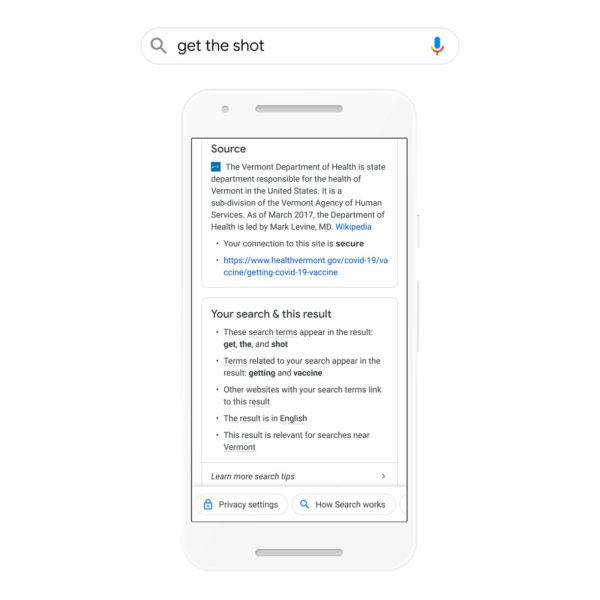Google now list several of the factors it used to rank a result in the about this result section.
Google Search can show the terms it matched on the web page and your query, including the terms that were related but not direct matches. Google also lists if links from other websites influenced the ranking, if the results had related images, if there were geographical reasons for the result ranking and more. In fact, Google said there are several factors this section can disclose when it comes to why Google ranked a specific page in its search results.
Google also lists search tips in this area to help you refine your query, if you find the result does not meet your desired outcome.
What it looks like. Here is a screenshot of what this looks like. As you can see in the “your search & this result” section, Google lists numerous bullet points for why it ranked this specific snippet. The “Source” section above is old and was launched in February, as mentioned above.

What factors does Google show? Google did not tell us all the factors it shows, but here are the ones I spotted while testing:
- Search terms that appear in the result. In this case, Google will show you what terms were matched from the searcher’s query to the content and/or HTML on the web page that Google ranked. Matches are not just the visible content but also can be words in the HTML, like the title tag or other meta data.
- Search terms related to your search. Not only will Google match based on your exact query but also terms “related” to that query. In the example above, the query was [shot] but Google expanded that to mean “vaccine.”
- Other websites with your search terms link to this result. This is where sites that have these search terms on their pages and links, actually link to the result listed in the Google Search results. Clearly, links are still used by Google for ranking purposes.
- This result has images related to your search. Google will also look at the images on the page to determine if those images, perhaps the file name of the image, are on that page and are related to your query.
- This result is [Language]. Language is important and right now this is an English only feature, but when it expands, Google can show other languages. So if you search in Spanish, Google may be more likely to show you Spanish results. Or if you search in Spain, Google may show you Spanish results as well.
- This result is relevant for searches in [region]. Google may use the searchers location, the site’s location and the query to determine if the searcher wants to find a web page that is more relevant to a specific region. In the example above, someone searching in Vermont to [get the shot] probably wants to get local vaccine websites in Vermont. Sometimes queries can be down to the city level and sometimes the region is not relevant. Google will show those details in this area.
Search tips. Google will also let searchers hover their cursor over the underlined words in this box to get search tips on how to better narrow their search results. In the screenshot below, you can see Google suggesting the search may want to add a minus sign to the word “running” in order to filter out those words in their search.
Google can offer a number of search tips that are specific to the query and the “about this result” box for that page.

Rolling out now. Google is now rolling this out in the U.S. for English results. By the time of publication, we expect it to be visible in 10% of the US-based queries, but by next week it should reach about 100% of queries in the US. Google said it will expand this to more countries and languages over time.
Google would not say how many searchers actually use this “about this result” feature but clearly, Google is investing in expanding its feature set. Google did say the “about this result” feature has been viewed hundreds of millions of times but would not share what percentage of users have used it.
Why we care. SEOs and marketers always wanted to know why Google ranked a specific site for a given query. Well, Google is now giving you pretty detailed clues into why it ranked that site for that query with this new box. Of course, this is not detailed ranking weights and signals, but it does tell you if the words match or match closely, if people link to the site, if there are geo-specific reasons and more.
From the searcher’s perspective, it might help a searcher understand why Google ranked that result and enable more trust through transparency.




